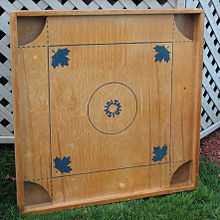Pichenotte

Pichenotte is a French Canadian tabletop game, with a board, game pieces and rules similar to carrom. Used more broadly, the term is a general name for tabletop games played with small (usually wooden) pieces that are flicked using the thumb and index (or middle) finger, including such games as carrom, sharing a similarity in that their mechanics lie somewhere between pocket billiards and shuffleboard. The term is sometimes also mistakenly used as the actual name of other games of this class, such as carrom and crokinole. Commercially produced boards are available, some under the trade name Pinnochi. The game is sometimes referred to as "piche" or "pish".
Origins
In Quebec, the flicking action used in the game is called a "pichenotte" (standard French "pichenette"), from which the game name is derived. While the specifics are uncertain, pichenotte certainly must have originated from the Indian game carrom. In the mid-19th century, carrom was likely brought to Canada by Indian or British immigrants.
Equipment

The game is played on a board of lacquered plywood, normally 28 inches square (71 cm). The edges of the playing surface are bounded by raised wooden sides. The object of the game is to strike a wooden disc such that it contacts lighter discs and propels them into one of four corner pockets. These pockets are usually larger than those on Indian carrom boards. The playing pieces come in two colours denoting the two players (or teams, in doubles play). An additional piece is coloured red (or other unique colour) and called the "queen" or "king".
Rules
The aim of the game is to sink one's eleven pieces before the opponent sinks theirs. However before sinking one's final piece, the queen must be pocketed and "covered" by pocketing one of one's own pieces on the same or a subsequent shot. Fouls, such as crossing the diagonal lines on the board with any part of one's body, or scratching (pocketing the striker or sending it off the board), lead to one of one's pieces being returned to the board.
Variations
Another variant of the game called pitchnut has four screws or pegs 4 inches (10 cm) from the centre of the board, and two screws or pegs in front of each pocket. It also has 2-inch (5-cm) recessed alleys along each side.
See also
References
External links
- Quebec Pichenotte Players Association - About Quebec Pichenotte Players Association -> contains rules, events, news